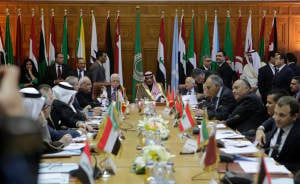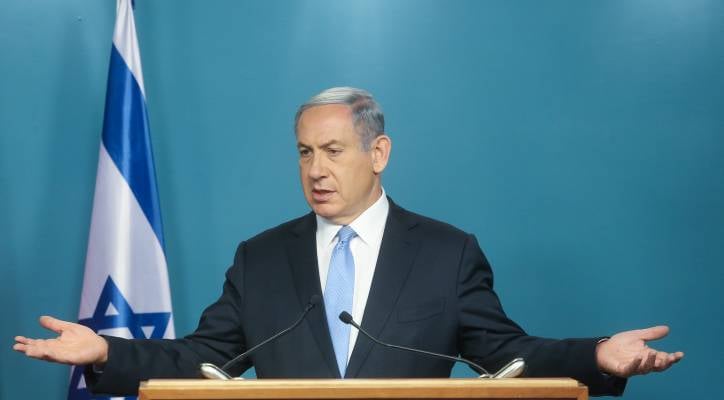Prime Minister Netanyahu said that enlisting the help of moderate Arab nations to promote the stalled Israeli-Palestinian peace process would be a positive development.

Palestinian President Mahmoud Abbas, center left, Kuwaiti Foreign Minister Sabah al-Khaled al-Sabah, center, and Arab League Secretary General Nabil Elaraby, right, in a meeting at the Arab League headquarters in Cairo, Egypt, January 2015. (AP/Amr Nabil)
Prime Minister Benjamin Netanyahu said Thursday that enlisting the help of moderate Arab nations to promote the stalled Israeli-Palestinian peace process would be a positive development, but that any agreement would still require Israeli control over Judea and Samaria.
“The fact that we can engage some of the Arab states in dialogue over regional issues, due to our shared concerns on the Iranian nuclear threat, means that we can also get them to assist on the Palestinian issue,” Netanyahu told reporters in Tel Aviv, Israel Hayom reported. “If we can harness [the help] of some of the Arab states to find a solution to the [Israeli-Palestinian] conflict, that is a welcome thing.”
Yet Netanyahu, for the first time publicly, rejected the 2002 Arab Peace Initiative that suggested a comprehensive peace plan between Israel and Mideast Arab nations in exchange for an Israeli withdrawal to the 1967 lines. The 2002 initiative “proposes, among other things, that we cede the Golan Heights, which I assume no one agrees to nowadays,” he said.
Netanyahu said that if the Palestinians were to agree to Israeli security control over Judea and Samaria and “change their approach,” that would facilitate “a different reality.” But the Palestinians, he said, “refuse to give so much as an inch.”
“I haven’t deviated from a solution that entails a demilitarized Palestinian state, but, as I explain to those asking, the question is not where to draw the border, but what will be on the other side of it. … The question is, what will the regime and security situation be like in the areas we withdraw from? The answer is understood by all, and no one has a better answer than Israeli control,” said Netanyahu.
By: JNS.org
